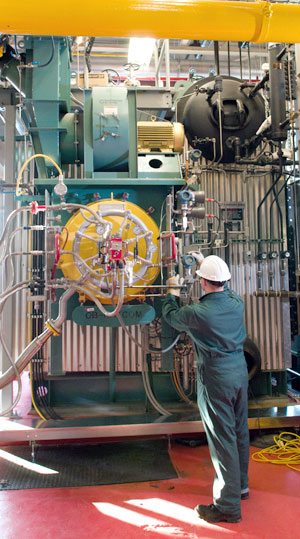Update: The Power Engineering Department will have an open house on April 13 and 14, 2012. Click here for more info!

"I sell here, Sir, what all the world desires to have -- POWER."
- Matthew Boulton, English manufacturer and business partner of Scottish engineer James Watt.
Power Engineering
What you will find in this presentation
Thank you for taking an interest in power engineering, the rarely-talked-about profession that makes a huge impact in our daily lives!
The information in this presentation is neatly categorized to make sure you won't be bombarded with huge walls of text. Before jumping to right-hand menu, since we know you're eying the "wages" category, start with the following section about what a power engineer is.

What Is A Power Engineer?
Power engineers operate, maintain, and manage industrial plants that use pressurized equipment such as boilers and refrigeration units. Other large pieces of equipment include steam and gas turbines, generators, gas and diesel internal combustion engines, pumps, condensers, compressors, pressure vessels and their related controls.
A lot of this equipment is found in electricity-generating plants, food processing plants, heating plants, hospitals (steam plant), breweries, fuel refineries and pulp mills, just to name a few places.
In every Canadian province and territory, only certified power engineers are permitted to operate such equipment.
In British Columbia, power engineers are governed by two key pieces of legislation (which are described in the Laws Regulating Power Engineers section in the right-hand menu).
Successful power engineers have a really good grasp of thermodynamics, heat transfer, applied physics, fluid mechanics, electrical systems, pneumatics, industrial computer control systems, instrumentation, chemistry and pollution control systems; in short, a bit of everything.
Power engineers also perform maintenance and have the skills to weld metal, thread pipe, take apart machinery (and sometimes putting it back together again) and quickly troubleshoot operating problems as they appear.
Above all, power engineers are responsible for the safe and efficient operation of a process system.
If you're still reading this, excellent! That means those last three lines didn't scare you off. Also, most of those skills are taught during the course of a power engineering program.
In fact, the prerequisites for power engineering are pretty basic, as you'll see in the prerequisite section of this presentation.
Now that the formal introductions are out of the way, go on and explore the links on the right.
The BCIT Power Engineering Department encourages you to explore all the parts of this presentation to see if power engineering is right for you. :)